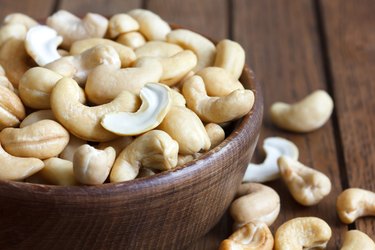
Making smart food choices is a must for those who want to look good and feel great. Unfortunately, certain foods -- such as those low in fiber, like cashews -- can lead to the development of constipation and other painful gastrointestinal conditions. If you develop constipation after eating cashews, you may want to talk to your doctor to ensure you're not allergic.
Constipation Basics
Video of the Day
Constipation -- which affects around 80 percent of the U.S. population -- is often described as infrequent, small or painful bowel movements. While a number of factors may lead to the development of constipation, following a diet low in fiber and fluid is often to blame. The American Society of Colon and Rectal Surgeons recommends 25 to 30 grams of fiber and 60 to 80 ounces of water each day to avoid constipation.
Video of the Day
Fiber in Cashews
Each 1-ounce serving of raw cashews provides only around 1 gram of dietary fiber -- about 4 percent of the daily recommended intake for this nutrient. In comparison, the same amount of peanuts has over 2 grams of fiber and an ounce of almonds has over 3 grams.
Cashews as a Food Allergen
Nuts -- including cashews -- can cause an allergic reaction. If you're allergic, one possible gastrointestinal sign of a reaction is constipation. Nut allergies can be serious and cause life-threatening symptoms. If you're experiencing constipation after eating nuts and you suspect an allergy, see a doctor.
Incorporating Cashews in Your Diet
Even though they're not packed with fiber, cashews can still make up part of a healthy diet, as long as you're not allergic. In fact, the healthy mono- and polyunsaturated fats found in nuts -- like cashews -- appear to be effective when it comes to improving heart health. For a fiber boost, consider pairing them with higher-fiber foods, like fruits and vegetables, for a nutritious snack.
- American Society of Colon and Rectal Surgeons: Constipation
- USDA National Nutrient Database: Nuts, Cashew Nuts, Raw
- Patient.co.uk: Food Allergy and Intolerance
- Harvard Health Publications: Eating Nuts Promotes Cardiovascular Health
- USDA National Nutrient Database: Nuts, Almonds
- USDA National Nutrient Database: Peanuts, All Types, Raw
Is this an emergency? If you are experiencing serious medical symptoms, please see the National Library of Medicine’s list of signs you need emergency medical attention or call 911.